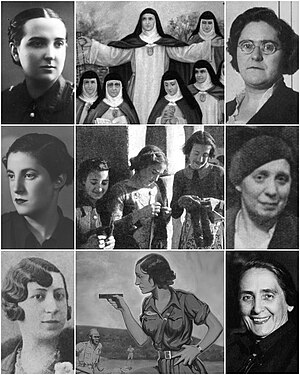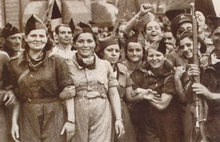| Part of a series on |
| Women in the Spanish Civil War |
|---|
 |
|
|

Milicianas fought in the Spanish Civil War. They came from a culture with iconic fighters, and where women had been recently empowered through direct political engagement in political organizations and labor unions. The Dictatorship of Primo de Rivera saw women take more to the streets to protest and riot, though their actions were dismissed by male political leaders. The creation of the Second Spanish Republic led to an environment encouraging active political participation in broader Spanish society, and ultimately served to assist many women in their decision to head to the front, as the Government expanded rights for women, including the right to vote, divorce, go to school and stand for election.
The Asturian miners' strike of 1934, three years into the Republic's history, saw women mobilized on a battlefront where they defended the rights of striking miners. This created paranoia on the right that women would take up arms and dispense with male leadership. Two years later, the Spanish Civil War started in Melilla and soon expanded nationwide. Women rose up to defend the Republic, playing a critical role in making the war a protracted affair. The start of the Civil War saw women mobilized in militias affiliated with unions and political organizations, with over 1,000 women joining up in the opening months to serve on the front lines of the Republican side. Unlike men, women actively sought out this choice. Communists and anarchists would make up the bulk of women on the front. Women also came from abroad to fight in the International Brigades.
On the front, women served alongside men in mostly mixed-gendered battalions, and were transferred around Spain. Despite a desire for combat, some of those in male leadership positions made them serve in support roles. Women were killed and injured on the front. The first Spanish Republican woman to die on the battlefield was Lina Ódena on 13 September 1936. They were on the front from July 1936 to March 1937, when they were officially demobilized. This decision was made by male political and military leaders, who were threatened by their presence. The decision was opposed by the women themselves.
The valuable contributions of Republican women fighters has been under reported, and women's own stories have frequently been ignored. This was a result of sexism, women fearing torture and death, and lack of primary sources.
© MMXXIII Rich X Search. We shall prevail. All rights reserved. Rich X Search
